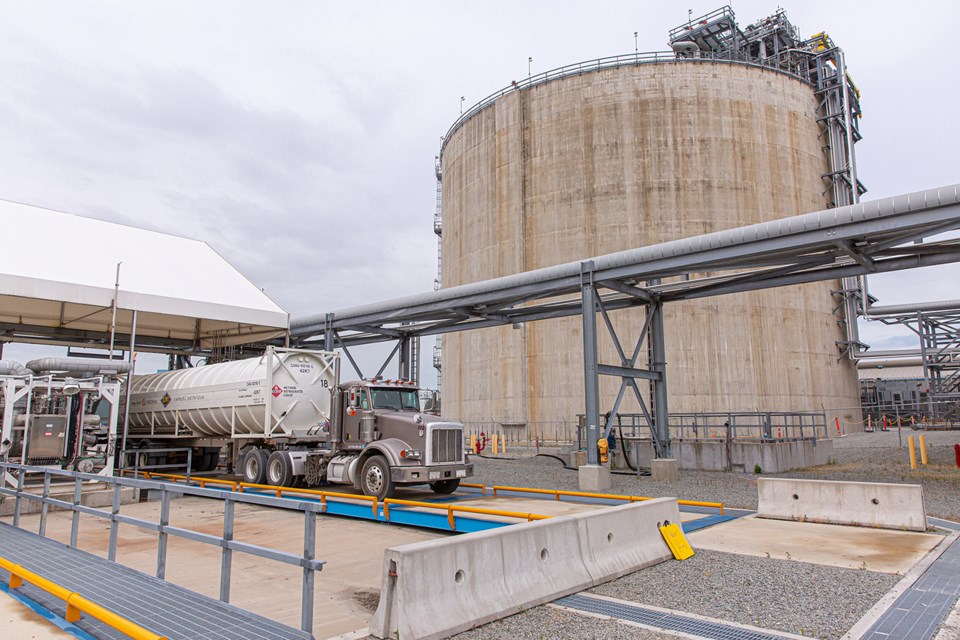The environmental assessment process is still playing out for FortisBC’s proposed Tilbury LNG Expansion and the Tilbury Marine Jetty projects in Delta, but that isn’t stopping the utility from announcing agreements.
On Wednesday (Aug. 10), FortisBC Holdings Inc. and the Musqueam Indian Band announced the signing of an agreement which will see Musqueam and FortisBC working in close collaboration on the projects.
FortisBC said in recent years they have worked to develop a mutually beneficial relationship and the Tilbury LNG Projects Agreement is a direct result.
It includes options, subject to regulatory approvals and certain conditions, for the Musqueam to acquire equity ownership in the two proposed projects.
The Metro Vancouver board at its July 29 meeting voted in favour of a motion put forward by Delta Mayor George Harvie to defer deciding on a position on the LNG projects in Tilbury until the combined provincial and federal environmental assessments (EA) are done.
However, the board vote on the motion wasn’t unanimous.
The board was set to vote on a recommendation from Metro’s Climate Action Committee for the regional district to convey opposition to the Tilbury LNG plant expansion, as well as the adjacent Tilbury Marine Jetty Project, because “of overall concerns related to upstream and downstream greenhouse gas emissions and inconsistency with Metro Vancouver climate targets.”
Harvie said, “I always support the environmental assessment regulatory process. The provincial and federal staff are very qualified and it is a non-political process.”
The City of Delta will not take a position to support or oppose until the EA plays out and all the information is available, he added.
FortisBC, saying the Metro staff report was flawed and left out important facts, also requested a referral so that additional information was gathered.
Following the board’s vote, FortisBC in a statement to the Optimist said the utility is continuing to work collaboratively with Metro Vancouver, Indigenous nations and stakeholders through the environmental assessment process.
“The Tilbury Marine Jetty and Tilbury LNG Expansion are important developments that will support provincial climate action targets, increase the resilience of the energy distribution system, as well as deliver meaningful local and regional air quality and economic benefits. We look forward to continuing our engagement on these projects with the community,” FortisBC said.
Voting to oppose deferral, Metro directors, Adriane Carr and Harold Steves, councillors from Vancouver and Richmond respectively, implored the regional district to oppose the expansion of fossil fuel infrastructure. Both their city councils have already expressed opposition to the expansion of LNG facilities on the shores of the Fraser River.
Carr said the science is clear and not political.
“We are at the 11th hour in terms of mitigating climate change and the scientists are imploring politicians to very rapidly phase out our use of fossil fuels. Expanding fossil fuel infrastructure is not the way to go,” she said.
Carr also said the climate committee expressed concern about the safety of LNG facility expansion in residential areas.
Noting the LNG vessels will travel by his city, Steves, among his concerns, said new LNG facilities are no longer permitted near residential areas in the U.S.
He warned, “If a vessel blows up, all of Steveston disappears, and that’s a bit of a concern.”
The BC Environmental Assessment Office (BC EAO) notes that the next phase of the EA process for FortisBC’s Tilbury LNG Expansion Project is the Application Development and Review phase, during which FortisBC will develop its application and engage participating Indigenous nations and Technical Advisory Committee members.
Meanwhile, the comment period on the BC EAO draft assessment on the Tilbury Marine Jetty Project is open until Aug. 15.




